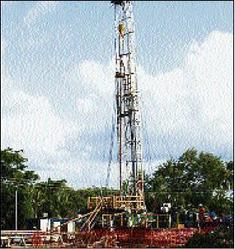Linda Hutchinson-Jafar, Business Writer

A drilling rig in the twin-island republic of Trinidad and Tobago as depicted on gstt.org.
Port-of-Spain, Trinidad:
Methanol Holdings Trinidad Limited (MHTL) and the Uni-versity of Trinidad and Tobago (UTT) have teamed up to pioneer using electricity generated by methanol instead of natural gas to power up two methanol plants.
Officials here said if the US$12 million two-year experiment is a success, it intends to target the net oil-importing countries of the Caribbean to use the cheaper fuel source for electricity generation. Electricity generated by methanol has already been fired up at the demonstration power plant in Point Lisas, in the bustling industrial central region, on the site of one of MHTL's plants.
"We're currently doing testing, it is working," said Dr. Haydn Furlonge, associate professor at the UTT's Natural Gas Institute of the Americas.
At the end of the study period, the Institute plans to hire resear-chers to investigate the mechanical integrity, efficiency and reliability, the environmental impact and the economic feasibility for niche markets.
Electricity
Work has already been done in the United States (U.S.) on generating electricity from methanol, but Furlonge said it was the first time that a demonstration plant has been built to carry out the experiment to generate electricity for the operation of methanol plants.
A demonstration power plant consisting of an 8.5 megawatt standard gas turbine, which has been modified to use methanol instead of natural gas, will run at full load over the next two years, supplying electricity to two of MHTL's methanol plants.
MHTL is the largest supplier of methanol to the U.S. and the world's second largest producer with a total production capacity of 4.1 million metric tonnes per annum from five plants.
"While the project is scheduled to take place over a full two year period, we anticipate that within six months of operating this facility, we shall have facts and figures to demonstrate that this environmentally-friendly route to power generation can provide a competitive and sustainable source of electricity based on long-term supply contracts," said MHTL's deputy chairman, Joe Cassidy.
He said at an appropriate time, MHTL, a member of the CL Financial operations, and the UTT plan to invite energy leaders from all over the Caribbean to visit the demonstration plant to see the achievement.
Cassidy explained that one million tonnes of methanol can generate approximately 250 MW of ultra clean power. One million tonnes of methanol requires 36 million MMbtu's of gas which equates to less than 2.4 per cent of Trinidad and Tobago's current annual gas consumption.
Energy needs
With thi he said Trinidad and Tobago could support the Caribbean's energy needs with electricity at stable and predictable prices, competitive with current prices and going well into the future.
The methanol to electricity concept is hinged on the government's plan to study the viability of running a gas pipeline through the Caribbean to assist its energy-dependent neighbours.
"As we all know, the Caribbean market suffers from very high energy costs, where petroleum fuels are sold at a premium. Considering this and the high investment cost of such a pipeline, MHTL quickly arrived at the conclusion that with our competitive manufacturing position and our fleet of some 10 tankers, we could create a 'virtual.

